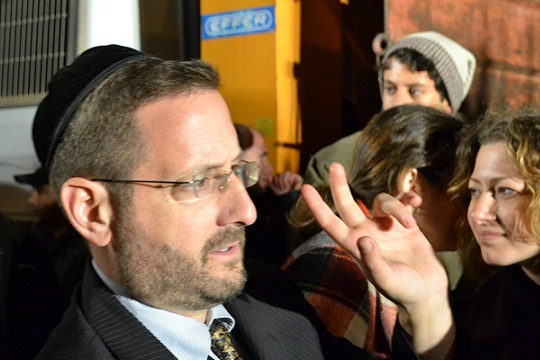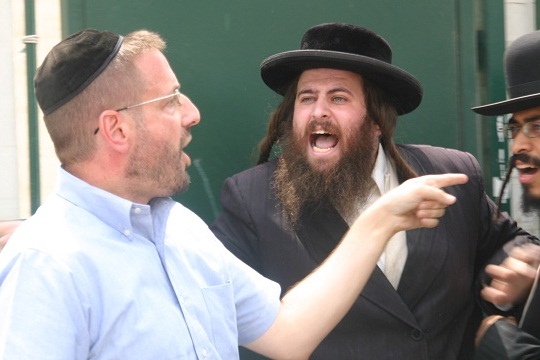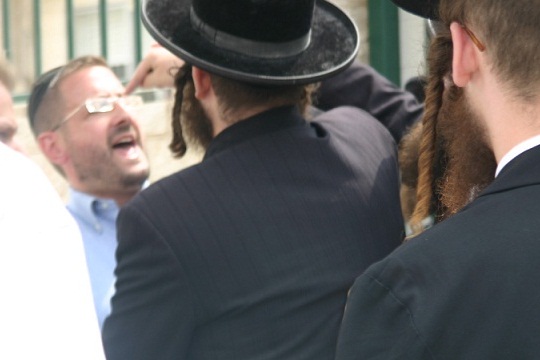Rabbi Dov Lipman is soft-spoken and not even 41 years old, but has seen his share of action on the battleground of Israeli society. He’s taken verbal beatings and sustained physical injury. He’s won praise and publicity, and drawn fire too, for his tireless struggle against religious extremists literally next door.

Lipman is a Haredi-ordained educator (Haredi = ultra-Orthodox), and a religious Zionist with a liberal bent – a rare bird in these parts. His main political arena is his home, the city of Beit Shemesh not far from Jerusalem, with its growing Haredi population. This year, Beit Shemesh became ground zero for inter-Jewish religious tensions after a spate of attention to Haredi incidents and habits (not only in Beit Shemesh) that outraged the general public, including: gender-separated buses, separated sidewalks, and ultra-Orthodox soldiers staging a walkout protest against women singing at IDF ceremonies.
The public kicked back. Tanya Rosenblit refused to sit in the woman’s section of a public bus frequented by Haredim, and was rapidly labeled Israel’s Rosa Parks.
Then came Naama Margolese. A television item interviewed the eight-year old religious girl who related how she was harangued on her way to school in Beit Shemesh for not dressing modestly enough – not an isolated incident, but a regular occurrence. Naama was called a whore; her Haredi aggressors spit on her. The country went up in arms, and suddenly Dov Lipman was everywhere. Even before that, he had been accompanying the girls to school to protect them: “I was called all sorts of horrible names by them,” he says, referring to the “extremists” – “they turned on me – screaming, poking, and I was even spat on.”


Following the public outcry, an impassioned protest rally was held in Beit Shemesh near the Orot Girls’ school – Rabbi Lipman spoke at the event. The demonstration was organized in part by a movement for religious pluralism started by Meretz MK Nitzan Horowitz, who were new and unusual partners for the rabbi.
He attended a Hanukkah candle-lighting ceremony at the Margolese home, together with Shas MK Haim Amsalem. Finally in July he jumped onto the national stage one Saturday night, when he was invited to speak at a large rally in Tel Aviv demanding a new draft law for Haredim. He was an odd figure among the throngs of largely secular demonstrators, drawn partly from the previous summer’s scrappy social protest. Lipman gave a speech rich with Biblical and Talmudic references encouraging both work and study, and advocating service to the country as the fulfillment of Torah. When he implored the Prime Minister to show leadership and said that he had voted for him, the crowd booed. But it cheered wildly at his general message.
Kicked into politics
As Rabbi Lipman explained in an interview with +972 this week by phone, the problems in Beit Shemesh began years ago – he encountered them just months after he moved to Israel in 2004, with his wife and four children, and broad American vowels in his Hebrew. He did not intend, he says, to go into politics.
One day, he left his house to find Haredim rioting right outside. The next moment, a rock smashed into his leg, sending him home bleeding. It was a watershed moment. “With all the dreams of a better life, and Zionism, and being here with the Jewish people, I never expected that rock to come from another Jew,” he told me this week in an interview. Elsewhere, he was quoted as saying he had been prepared to have rocks thrown at him by external enemies; but not Jews.
The incident shook him. Then in 2008, a Shas candidate won the mayoral elections after Shas spiritual leader Ovadiah Yosef promised voters “ha’olam haba,” (the next world).
Lipman, who had been managing the campaign of another religious candidate, became increasingly worried, and increasingly active as the “unofficial opposition.” He read about Shas dissenter Haim Amsalem, who was summarily expelled from the party after critiquing Shas for failing to encourage greater Haredi integration, and began working with Amsalem’s new movement. It was a crash course in media training (they have since parted ways).
Lipman is now positioned to try bridging the deep political and social divide between the religious and secular Jews and advancing moderate religious Judaism. It’s a thankless job; others before him, such as Rabbi Michael Melchior, have not succeeded: Religious politics have grown more hard-line over the decades. Aside from the Jewish-Arab divide, this is the deepest chasm in Israeli life.
Rabbi Lipman is convinced that it doesn’t have to be that way.
Fixing his own house first
In our talk, he focuses heavily on “religious extremism,” and speaks of “extremists,” never referring to Haredim in general. While he referred to them as “prisoners” of their own isolationism in his Tel Aviv speech, he is searching for partners among them too. Lately, he says that more and more Haredim are coming to thank him for “being our voice.”
He is devoted to the challenge, stating repeatedly that “I want to be the unifier” of Jews in Israel.
“There must be things that make us one big nation and we need to emphasize those, not what makes us different…that’s the beauty of the Jewish country – I would get rid of Ashkenazi and Sephardi, and I would make it minhag Israel,” he explains, referring, perhaps metaphorically or perhaps not, to cultural styles of Jewish prayer and ritual.
But the unifier has already broken his first serious political partnership, with Amsalem – which could have been a fine symbol of Ashkenazi-Mizrachi unity. He explained that Amsalem was focused mainly on the Mizrachi community; whereas he is committed to a broader project.
“It’s very possible that I’ll find myself more affiliated [politically -ds] with a secular community. Politics is compromise, but not of your core values. If I’m going to talk about working with seculars, I’m not going to talk about it and not do it. If I talk about women having a central role on the political level, I have to have women involved.” It’s worth noting that the latter sentiment is not heard sufficiently from men on any side of the political map.
Lipman’s work in Beit Shemesh, therefore, seems cut out for him. He is considering his options in local politics and for the meantime, modestly says he does not rule out seeking the position of deputy mayor of Beit Shemesh in the future.
National Stage?
Lipman projects an American yes-we-can kind of optimism and clarity on his core themes – Jewish values, unity, humanism and anti-extremism. He speaks fluidly, as if his days involve one long rolling conversation. Many of his words are straight out of his recent and prolific articles, but he doesn’t sound message-boxed – the articles just seem like an extension of his voice and they address an ever-broadening scope of national issues: the problem with Haredi education, education in Israel in general, Iran, the draft, religion and politics, African migrants. He is honing his thoughts, building his own movement (website under construction) – and it’s hard not to see him vying in the future for a national position in the Knesset, for example, although he isn’t talking about that option yet.
To that end, how does the mission of uniting the Jewish identity of Israel include the Arabs, one-fifth of the population?
Lipman launches into a well-developed explanation that core Jewish values mean treating all people equally, including non-Jews (especially non-idolaters).
“The Arabs in Israel deserve to be treated as regular citizens of the state, to get all the services they deserve.” He does not address them as partners in forging the character of the state, but instead moves on to extend the same sentiment to African migrants:
“I was very disturbed by terminology coming from Knesset. What happened to our Jewish values? …[To] speak in such racist and divisive terms! We’ve lost our Jewish values. That’s an area where I stand very firm and very strong, and for any non-Jewish population in Israel.”
The rabbi and the elephant
The loss of Jewish values is one of his biggest themes. And for him, the conflict with the Palestinians is one of the causes.
“[The conflict] …has caused us to lose our way as Jews in Israel. Until 1967, the religious Zionist community in Israel was very focused on building a Jewish values-based country. And since 1967 religious Zionism has been defined as fighting for the territories and not focused on what kind of country we are internally.”
This statement hints at something deeper than just his current focus on internal affairs; could Lipman be implying that Judaism should turn its focus on spiritual and moral values rather than material aspects, such as specific pieces of land?
He indicates de facto acceptance of two states as an endgame: “There’s no way around the fact that the international community and Diaspora Jews have accepted the notion of two states,” he says. He wrote in a later email: “It is certainly a problem that we have control over a people who do not have full rights (the Palestinians).”
And yet, he may actually hope to stave off such an outcome through continued settlement growth. In a recent column for the Times of Israel about Ulpana, the settlement neighborhood built on private Palestinian land, he wrote: “I happen to be against evacuating these homes and think we should pay the Palestinian owners for having built on their land.”
He tells me it is “a mistake” not to allow construction in existing settlement blocs, which would presumably remain in Israel under most two-state agreements.
I ask flat out about land grabs, but he says that too is a mistake.
“I don’t think we should be grabbing as much as possible before a deal. It’s very clear what the blocs are… If the land was illegal and is Palestinian ownership[sic] we have to find a solution for it.”
Rabbi Lipman followed up our talk with an email to make sure it was clear that he does not view Israel as the party to blame. 1967 was self-defense; it was Israel who offered concessions and solutions, which were rebuffed – he blames the Arab leadership at the time.
Still, it goes back to Jewish values: “Having control over a people who don’t have full rights is a conflict for me in terms of our values.”
But do his Jewish values, I ask, really involve a hostile occupation and a divinely-inspired army?
Lipman after all has written: “I, personally, see IDF service as the fulfillment of one of the highest of Jewish ideals.” At the rally in Tel Aviv, he said: “In a few years, my son will serve in the army. And not only will I be proud of him, but God will be proud of him.” It’s getting hard for me to avoid seeing this as the mirror image of accusations that the Palestinians (and Muslims generally, in this argument) use religion to justify violence.
When asked, Lipman concurs that there are specific problematic incidents, a common theme for Israelis who believe the exception proves the rule of a moral army. “Of course there are times when soldiers overstep bounds and they are caught and punished and I’m proud of that.” He doesn’t avoid addressing the overall policy, but blames the leaders, not the IDF:
“As for the general idea that we are in lands where people don’t have their rights, I don’t blame the IDF for that. I think that we as a country have to figure out the solution.”
Cracking the armor
Lipman has a knack, and perhaps a tendency, to ruffle his own community – in the social media age, this exposes some fascinating discussions I don’t often get a chance to see.
He recently wrote an article categorically condemning extreme-right settlement leaders Itamar Ben Gvir and Baruch Marzel, who had verbally assaulted Noa Rothman, granddaughter of the late Prime Minister Yitzhak Rabin. Friends immediately denounced his views; the ensuing Facebook conversation had nearly 70 comments and was full of vitriol – against the left, the press, the Oslo accords, Lipman – and when I jumped in, against me. It was a blunt reminder that Rabin still opens a major and jagged-edged crack in religious circles.
It was also striking to read how some religious participants spoke of secular people as a foreign tribe. The hostile images focused largely on how much seculars hate the religious.
I was taken aback to learn that the US-born and raised Lipman shared this impression himself until recently. After the past year, he says “What I’ve learned is that, generally, the secular community in Israel is far less anti-religious than I always thought they were.”
It’s worth asking how it came to this, and what role seculars and left-wingers have played themselves.
Lipman’s views are moderate sounding to my ears, he is fighting a very strong headwind in his circles, and some red-hot anger. How does it feel to take such criticism from his own sector?
“It was hard to receive letters and emails from people who say ‘you’ve lost your way, what’s happened to you?’ I don’t view myself as having lost my way. I think: What do core Jewish values say? If someone tells me that protesting against hurting little girls means losing my way, I’m totally confident.”

